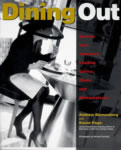Dining Out
Following in the path of the pioneering and successful Becoming A Chef, Dornenburg and Page interview a broad cross-section of restaurant critics, mix them with a smattering of chefs and restauranteurs, and assemble the result into a breezy and readable exploration of food criticism.
The core argument, approached here from many directions, is that food is interesting and merits criticism. Food crit has been traversing a different path than lit crit in the past decades. Postmodernism argued that we were paying too much attention to whether writing and film were art and not enough attention to whether we were having fun. American food writing used to be entirely about whether we were having fun, and only recently and tentatively have we begun to explore the idea that dishes are constructed, that we can have ideas (and arguments) about food that are deeper than, "I don't like olives."
This volume might have been more convincing, in the long run, if it had simply assumed its conclusion and proceeded to explore the ideas. I'd like to know more about what critics would do if their editors and readers permitted. I'd like to know more precisely, too, whether restaurant critics are as influential as they believe: one critics laments that movies can survive bad reviews but restaurants can't, but nobody offers much evidence one way or another.
What we need next, I think, is more close examination of exactly how the food business works, when it's working well. Michael Ruhlman and Anthony Bourdain are on the right track here, I think, in taking the space to show in great detail what actually happens in routine prep and service, and reminding us how hard this all is, and why.
